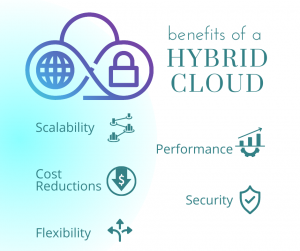 Cloud. Public Cloud. Hybrid Cloud. Multi-Cloud. There are so many options now. How do you choose which is best for your business?
Cloud. Public Cloud. Hybrid Cloud. Multi-Cloud. There are so many options now. How do you choose which is best for your business?
Simply put, cloud computing is storing and accessing your data over the internet instead of on your computer’s hard drive or your company’s hardware platforms. Think of the cloud as a metaphor for virtual storage space. Cloud computing allows you to access your data remotely from any internet-connected device.
Hybrid-cloud environments combine public and private clouds. Below, we address what it is, the benefits, and how to choose a vendor for your hybrid cloud strategy here.
What Is the Hybrid Cloud?
A hybrid cloud is a storage infrastructure that combines the benefits of both private and public clouds. It offers businesses fast connections, a secure environment, and easy-to-access features of the public cloud. They have a combined management approach to give businesses flexibility as needs, demands, and costs change.
Hybrid models have grown in popularity because not everything belongs in a public cloud. They offer the benefits of both public and private clouds while taking advantage of existing data center architecture. By using a hybrid model, you get the scalability from a public cloud, with the reliability and performance of a private cloud.
Benefits of a Hybrid Cloud
 Companies are adopting a hybrid cloud approach to maximize the advantages of on-premises, private cloud, and public cloud. Flexera’s 2021 State of the Cloud Report shows that 78% of companies are now using a hybrid cloud approach.
Companies are adopting a hybrid cloud approach to maximize the advantages of on-premises, private cloud, and public cloud. Flexera’s 2021 State of the Cloud Report shows that 78% of companies are now using a hybrid cloud approach.
- Scalability
- Cost Reductions
- Flexibility
- Performance
- Security
Scalability
Hybrid clouds dynamically scale to meet changing business needs. Businesses utilize existing public cloud resources to quickly address unexpected or temporary spikes in demand (for example, retailers typically see spikes during the holidays). This helps them save time and money.
During the pandemic, scalability enabled workforces to quickly move to a remote model by utilizing public cloud infrastructure.
Cost Reductions
According to IBM, hybrid cloud platforms drive 2.5 times more value than a single-cloud approach. There are significant cost savings using a hybrid cloud model. Businesses substitute expensive data centers and servers now with cloud services. Hybrid clouds allocate public cloud resources for short-term projects. This costs much less than if you used your own IT infrastructure. If the space is only needed temporarily, you are not overinvesting in infrastructure equipment or the space that it takes up. Companies no longer have to add more hardware to their server rooms.
Flexibility
Hybrid cloud models offer access to more versatile and scalable IT services. This allows businesses to choose specific service levels as their needs change, rather than building out an IT architecture because of a temporary demand.
Prior to the COVID-19 pandemic, there was a movement for companies to move to more cloud environments. Overnight, companies experienced a significant need for their now remote workforce to be able to access files. By having a hybrid cloud option, companies can support their remote employees with on-demand access to data that isn’t tied to one central location. Now, providing flexible and accessible work environments is critical for attracting top talent and optimizing productivity and efficiency across organizations.
Performance
The public cloud excels at resource sharing, while the hybrid cloud adds performance by lowering the number of shared resources and hosts. Creating routine testing procedures is the first step in reaching optimal hybrid cloud performance. This keeps everything running smoothly and enables businesses to stay on top of any potential issues. Performance insights give you a heads-up about critical issues. Recommended routine performance checks include:
- Capacity testing
- Load testing
- Failover testing
- Latency testing
- Application testing
Security
With public clouds, 81% of businesses admit that security is a challenge. Hybrid clouds provide a secure environment with more controls and protection. Security for these hybrid models consists of three parts: physical, technical, and administrative.
Some of the most powerful technical controls are:
- encryption,
- automation,
- orchestration,
- access control,
- endpoint security.
Challenges of a Hybrid Cloud Model
 Developing a successful hybrid strategy is complex. This means optimizing performance, security, compliance, and cost. Because a hybrid cloud model combines public, private, and on-premises resources, complexity continues to increase as your hybrid cloud solution begins to take shape.
Developing a successful hybrid strategy is complex. This means optimizing performance, security, compliance, and cost. Because a hybrid cloud model combines public, private, and on-premises resources, complexity continues to increase as your hybrid cloud solution begins to take shape.
Technical resources and training are a challenge. Each cloud vendor offers different features that may or may not require additional technical knowledge. While most offer certifications for their products, not everyone has certifications for all of them, and their staff has limited time.
Which tools do you need? Selecting the best tools for your business And understanding how they work with one another is an additional challenge. Some help with cost management, while others manage workloads.
Designing an optimal hybrid cloud environment
Minimize costs while increasing performance by starting with and following a well-designed cloud strategy. Know what and who needs access to your data. The more you understand, the better your strategy is, resulting in lower costs and higher performance.
 How much of your data is appropriate to be on a public cloud?
How much of your data is appropriate to be on a public cloud?- What applications need to move to the cloud?
- What parts of your data need to adhere to compliance regulations?
- What tools can you use in both public and private clouds? Tools that work across environments rather than just one platform will be beneficial.
- What skill sets does your team already have? What is needed?
- How will you measure the success of your new hybrid cloud?
Summary
Hybrid clouds offer the benefits of both public and private clouds. They take advantage of existing data center architecture and offer flexibility and security. A hybrid model allows applications to interoperate across boundaries and between architectures. These strategies provide businesses with greater flexibility as needs and costs fluctuate.
About The Brixton Group
Founded in 1998, The Brixton Group Inc. is a values-based, technology staffing and project solutions company. Our mission is to provide unparalleled service to our clients, consultants and colleagues through our focus on long-term satisfaction.
Headquartered in Charlotte, North Carolina, Brixton employs a hybrid virtual and onsite workforce of experienced technology professionals delivering consultants and results to clients in 24 states, including a substantial percentage of the companies in the Fortune 100. We are comprised of a tight-knit group of successful achievers who are consultative and surgical in our approach. Our clients repeatedly acknowledge & appreciate our expertise, flexibility, execution, and integrity. Our business originates from referrals of existing clients, consultants, and associates which is a testament to how we conduct our business. www.brixton.net

